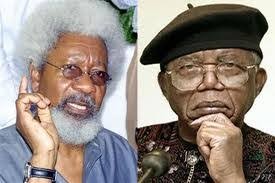ObidientZombies And Some Igbo Interpreters Of Maladies: How Dare You Compare Achebe With Soyinka
It is not uncommon in Nigeria for one ethnic group to make another ethnic group the target of ethnic slurs in form of unfavorable, derisive or disparaging jokes, sayings, or riddles.
Lately, Nobel laureate Wole Soyinka (WS) has been the target of ethnic slurs, disparaging jokes with denigrative epithets hurled at him by ObidientZombies and some Igbo interpreters of maladies. WS crime was characterization of Labor Party presidential candidate Datti Ahmed’s juvenile tantrums over the results of the 2023 presidential elections as fascism.
Igbo enmity against WS dates back to the time he was awarded the Nobel Prize in Literature in 1986.
Prior to WS winning the Nobel award, Chinua Achebe had been nominated many times but failed to make the final list. When WS clinched the coveted award on first nomination, some Igbos responded with venom and a tsunami of rantings. Some Igbo people believed Achebe was more qualified than WS and Achebe should have won the Nobel prize in Literature. Based on this assumption, they went into comparison overdrive. It is nonsensical in the least, comparing Achebe with WS.
During my undergraduate program at Temple University J-School (Journalism School), Dr. John Lent taught us History of Journalism. Lent was an authority on History of Journalism. While making references to geniuses of the pen, he gave example of WS. He said WS need not apply for any job. He said all that was required of him was “just show up” at any office and say “I’m Wole Soyinka.” According to Lent, he said the prospective employer would say “You got it!” I recall Lent’s remark to show the global reach and respect accorded WS.
WS works cut across all genres in literature. It is widespread and encompassing. The prolific literary output of WS eclipsed Achebe’s. WS is first among equals. Before you ask for my head on a platter, here’s the proof:
Plays written are:
Keffi’s Birthday Treat (1954)
The Invention (1957)
The Swamp Dwellers (1958)
A Quality of Violence (1959)
The Lion and the Jewel (1959)
The Trials of Brother Jero (1960)
A Dance of the Forests (1960)
My Father’s Burden (1960)
The Strong Breed (1964)
Before the Blackout (1964)
Kongi’s Harvest (1964)
The Road (1965)
Madmen and Specialists (1970)
The Bacchae of Euripides (1973)
Camwood on the Leaves (1973)
Jero’s Metamorphosis (1973)
Death and the King’s Horseman (1975)
Opera Wonyosi (1977)
Requiem for a Futurologist (1983)
A Play of Giants (1984)
Childe Internationale (1987)
From Zia with Love (1992)
The Detainee (radio play)
A Scourge of Hyacinths (radio play)
The Beatification of Area Boy (1996)
Document of Identity (radio play, 1999)
King Baabu (2001)
Etiki Revu Wetin
Alapata Apata (2011)
“Thus Spake Orunmila” (in Sixty-Six Books (2011)
Novels written are:
The Interpreters (1965)
Season of Anomy (1973)
Chronicles from the Land of the Happiest People on Earth (Bookcraft, Nigeria; Bloomsbury, UK; Pantheon, US, 2021)
Short stories
A Tale of Two (1958)
Egbe’s Sworn Enemy (1960)
Madame Etienne’s Establishment (1960)
Memoirs
The Man Died: Prison Notes (1972)
Aké: The Years of Childhood (1981)
Ibadan: The Penkelemes Years: a memoir 1945–1965 (1989)
Ìsarà: A Voyage around Essay (1989)
You Must Set Forth at Dawn (2006)
Poetry collections
Telephone Conversation (1963) (appeared in Modern Poetry in Africa)
Idanre and other poems (1967)
A Big Airplane Crashed into The Earth (original title Poems from Prison) (1969)
A Shuttle in the Crypt (1971)
Ogun Abibiman (1976)
Mandela’s Earth and other poems (1988)
Early Poems (1997)
Samarkand and Other Markets I Have Known (2002)
Essays
“Towards a True Theater” (1962)
Culture in Transition (1963)
Neo-Tarzanism: The Poetics of Pseudo-Transition
A Voice That Would Not Be Silenced
Art, Dialogue, and Outrage: Essays on Literature and Culture (1988)
From Drama and the African World View (1976)
Myth, Literature, and the African World (1976)
The Blackman and the Veil (1990)
The Credo of Being and Nothingness (1991)
The Burden of Memory – The Muse of Forgiveness (1999)
A Climate of Fear (the BBC Reith Lectures 2004, audio and transcripts)
New Imperialism (2009)
Of Africa (2012)
Beyond Aesthetics: Use, Abuse, and Dissonance in African Art Traditions (2019)
Films
Kongi’s Harvest
Culture in Transition
Blues for a Prodigal
Translations
The Forest of a Thousand Demons: A Hunter’s Saga (1968; a translation of D. O. Fagunwa’s Ògbójú Ọdẹ nínú Igbó Irúnmalẹ̀)
In the Forest of Olodumare (2010; a translation of D. O. Fagunwa’s Igbo Olodumare)
ObidientZombies And Some Igbo Interpreters Of Maladies: How Dare You Compare Achebe With WS?
•Written by Bayo Oluwasanmi


